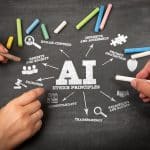What is AI and How Does it Work?
Artificial Intelligence, or “AI” for short, are computer systems designed to perform tasks that typically require human intelligence, like recognizing speech and analyzing trends in data. AI works by identifying patterns and then learning to make predictions or decisions based on that information. Most cutting-edge AI systems are powered by something called machine learning, a subset of AI in which algorithms are trained on huge datasets to continually get better. Consider the voice assistants Siri or Alexa. As you give them instructions, they learn to get better with time. These early systems are now called “Narrow AI” since they were designed for specific problems.
Other examples of Narrow AI include algorithms that recommend products on e-commerce sites or spam-detection tools in your email inbox. Narrow AI worked great within its constraints, but lacked flexibility and had a noticeably robotic experience. The recent emergence of “Generative AI” – like OpenAI’s ChatGPT, Google’s Gemini, or Microsoft’s Co-Pilot – has expanded AI’s capabilities to include creating text, images, and even music. These systems use something called “neural networks” trained on massive datasets, enabling them to “generate” human-like outputs. Generative AI, or “GenAI” for short, is much more flexible than Narrow AI and offers nearly infinite possibilities depending on what it’s trained to do.
How AI Impacts Everyday Life
For most people, AI is already a part of daily life. Even if they don’t realize it. It powers your personalized recommendations on Netflix, helps map and adapt routes in real time, and supports virtual customer service with Chatbots. In the workplace, AI can enhance productivity by automating repetitive tasks, conducting complex searches, or drafting professional email templates. These tools free up valuable time for employees to focus on creative and strategic initiatives.
For business owners, AI tools can optimize operations—think chatbots for customer queries, predictive analytics for inventory, or marketing automation to reach new audiences. Even if you don’t interact with AI directly, its influence on industries and daily conveniences means understanding its basics is increasingly important.
Why You Should Care About AI
AI matters because it’s reshaping the way we live and work. Whether you are technical, semi-technical, or completely non-technical, it’s imperative to understand how AI works and how it’s used today. It enhances productivity, reduces costs, and opens-up possibilities for innovation. However, understanding AI is not just about embracing its benefits; it’s also about navigating its challenges, like data privacy and job displacement. Even without direct interaction, everyone should understand the basic essentials of AI because its influence on industries and everyday life is constantly growing.
The Future and Relevance of AI
The next frontier is Artificial General Intelligence (AGI)—a truly intelligent AI system capable of performing any intellectual task that a human can. AGI could revolutionize industries, but for now it remains a theoretical goal due to immense technical and ethical challenges.
The potential of AI to benefit individuals and businesses is vast. As AI technologies evolve, they could help tackle complex global challenges, from climate modeling to medical breakthroughs. For businesses, integrating AI might be the key to staying competitive in an increasingly digital economy. For individuals, learning to coexist with AI will mean focusing on uniquely human strengths—creativity, empathy, and critical thinking. By embracing AI wisely, we can shape a future where humans and machines complement each other, creating opportunities we haven’t yet imagined.
Key Takeaways
- AI already influences daily life, from entertainment recommendations to customer service tools.
- Businesses can benefit from AI by optimizing workflows, reducing costs, and innovating faster.
- Staying informed about AI is essential to navigate its benefits and challenges effectively.
The future of AI lies in collaboration between human ingenuity and machine efficiency.
Interested in integrating more AI into your business? Contact us today!





